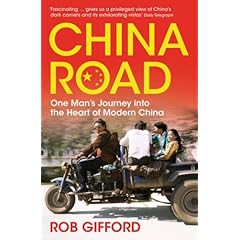 I just finished reading China Road by Rob Gifford and highly highly recommend it. I started the book quite a few months ago, but took my time reading it -- there was just so much to be savored, digested, and reflected upon.
I just finished reading China Road by Rob Gifford and highly highly recommend it. I started the book quite a few months ago, but took my time reading it -- there was just so much to be savored, digested, and reflected upon. Rob Gifford was NPR's correspondent in Beijing for 6 years, and before he left China to return to the UK, he took a 3,000-mile road trip along China's Route 312 -- a road that runs from Shanghai to China's western border with Kazakstan. The book is mainly an account of his trip, but also includes numerous anecdotal insights into the state of the country, collected by him during his stay in China.
This book made me feel much the same way as Rivertown (by Peter Hessler) -- another favorite China book. I learned a lot of new information, but also came across much that was familiar. And that which was familiar was so well put, giving words to some of the complex feelings I have had about China but never fully expressed. I think during my recent trip to Yangshuo, I realized that a lot of the emotions that I felt about living in China were left unresolved when I left and moved back to Hong Kong almost 5 years ago. I guess I've always had an intense love-hate relationship with the place, and it's been good to have to sort through some of that, and also somehow comforting to find others that express similar feelings (and do so more eloquently than I ever could!).
I am about to loan out my copy of China Road, so before I do, I felt compelled to go back through and find those parts that I really wanted to share. There are many other parts that would be worth adding here, and I could have spent hours re-reading sections and agonizing over what is really most blog-worthy, but here are a few excerpts that I found to be especially poignant. Please sit back and allow me to virtually read them aloud to you.
from Chapter 5: "A Single Spark Can Light a Prairie Fire"
"Pity the poor, long-suffering Chinese peasants. This was supposed to be their revolution. They form the majority of the Chinese population (some 750 million people), and they have suffered long and more deeply than anyone. They were promised so much. They were supposed to be liberated by this great experiment in social equality called Communism, but they have ended up back at the bottom of the pile. It is a betrayal of monumental proportions, considering the roots of the Communist revolution and its original aims, and a betrayal that could end up having monumental consequences for the Communist Party."
from Chapter 6: Silicon Valley
"There are nine cities in the US with more than one million inhabitants. In China there are forty-nine. You can be travelling across China and arrive in a city that is twice the size of Houston, and think, I've never heard of this place."
from Chapter 9: Power
"The tendency is to think of contemporary China in terms of the United States, because of their similarity of geographical size. Actually, to understand China today, the best comparison by far is Roman Europe two thousand years ago: lots of people with different languages and dialects, different customs, different artistic styles, even different cuisines, all with a shared heritage, but ultimately held together by force. It makes no more sense to say you're going out for a Chinese meal than to say you are going out for a European one."
from Chapter 23: A Road is Made
"It's impossible to be neutral about China. Some foreigners hate it from the moment they set foot here. Others love it so much they put down roots and never go home. I wonder if other countries divide people so intensely in their emotions. For myself, I have always tried to retain my own unity of opposites, attempting to keep love and hate in balance."




2 comments:
Wow, those excerpts are great. I particularly like the comment about Chinese food.
Hope to catch up with you on Sunday.
Helen
Post a Comment